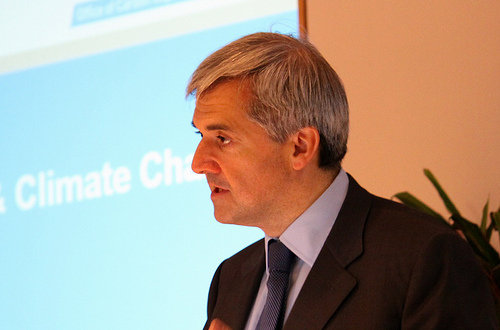UK energy minister: nuclear plans still on course
15 July 2010
The UK government is planning to strengthen national policy statements for energy to help ensure that large energy projects like new nuclear plants go ahead, the UK's energy minister has announced. Meanwhile climate change ministers from the UK, France and Germany have called for Europe to increase its CO2 emission reduction targets.
In a written statement to parliament released on the day of the latest meeting of the UK's Nuclear Development Forum, energy minister Charles Hendry said that the government would be launching a re-consultation on revised draft national Energy Policy Statements. The statements are a key part of revisions to UK planning reforms to help ensure large infrastructure projects like nuclear power plants can go ahead with the minimum of delay.
"Plans for the first new
nuclear power station to
begin generating electricity
by 2018 remain on course"
Charles Hendry,
UK energy minister
|
The UK's previous government, ousted in May 2010's general election, had already held a consultation on the documents. The new consultation is due to changes to the requirements for an appraisal of sustainability, which assesses the environmental, social and economic impacts of implementing a new policy, and includes comparison with "reasonable alternatives". Finalised versions of the statements are due to be ratified by parliament in spring 2011.
According to Hendry, the revised statements will give potential investors in large energy projects the maximum certainty they need, so that "sound proposals" will not become the victim of unnecessary hold-ups. "Plans for the first new nuclear power station to begin generating electricity by 2018 remain on course," Hendry told parliament.
Getting serious on emissions Hendry's statement was released on the same day that the climate change ministers of the UK, France and Germany jointly called for Europe to cut its greenhouse gas emissions by 30% from 1990 levels by 2020, rather than the current 20% target. In a letter published simultaneously in the
Financial Times,
Le Monde and
Frankfurter Allgemeine, Chris Huhne, Jean-Louis Borloo and Norbert Röttgen said that the 20% target was a key barrier to economic growth in Europe. Noting that the recession itself had cut emissions in the EU by 11% from pre-crisis levels, the ministers called for a target that would represent a "real incentive" for innovation and action in the international context.
 |
UK climate change minister Chris Huhne (Image: DECC)
|
A 30% target would not only represent a "genuine attempt" to restrict global temperature rises, the ministers noted. It would also impact on carbon prices to stimulate investment in green jobs and technologies, and enable European companies to compete internationally.
"This shows how seriously Britain, France and Germany take the low carbon agenda and how we want to work together to make it happen," Huhne said, adding that moving to a low carbon economy could help to deliver energy security and contribute to economic recovery.
New nuclear needed The ministerial comments should be welcome news to the UK's manufacturers, coming days after UK manufacturers' organisation the EEF published its energy action plan for 2010-2013.
The UK's current approach to energy policy is "no longer fit for purpose unless reformed," according to the EEF, which calls on the government to take the "difficult decisions" necessary to get the country's energy policy back on track. The document sets out what the UK's manufacturers see as the key governmental actions to keep energy policy on track. The completion of planning reforms and licensing processes to support new nuclear is identified as a top priority, with the completion of the Generic Design Assessment (GDA) exercise to qualify designs for new build nuclear plants another key activity.
The government must be prepared to "act in the best interests of the UK, even where this means challenging received wisdom or incumbent interests," the organisation warns.
Researched and written
by World Nuclear News